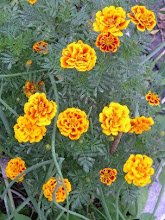 It occurs to me that this may be turning into a "food blog" of sorts. The sidebar link list I call "Foodies" grows longer every day, and the posts that I'm thinking about all seem to be about food. Maybe it's just that food, recipes, and food writing seem to be everywhere at this time of year. But, if so, I'm certainly in great company, as there are many and wonderful food blogs in Internet World. Witness this list of food blogs links from the grandmomma of them all, FoodBlog itself.
It occurs to me that this may be turning into a "food blog" of sorts. The sidebar link list I call "Foodies" grows longer every day, and the posts that I'm thinking about all seem to be about food. Maybe it's just that food, recipes, and food writing seem to be everywhere at this time of year. But, if so, I'm certainly in great company, as there are many and wonderful food blogs in Internet World. Witness this list of food blogs links from the grandmomma of them all, FoodBlog itself.So, two days ago the Local Harvest newsletter dropped into my mailbox; it was titled "Thanks for Winter Squash" and was a meditation on how to "eat local" during the winter months. It's a subject on which I myself have been meditating lately. I'm growing a few winter crops in planters in the back yard, and with the liberal help of frost blankets they are surviving thus far. Yesterday I did some preThanksgiving shopping at La Montanita Food CoOp, and was able to get local (we seem to consider southern Colorado to be local here) potatoes, apples, cider, and chiles. The subject of winter squash is one I have approached from mostly an esthetic standpoint - I think they are works of art, often buy ones that are particularly beautiful, then have no idea what to do with them. But, I'm learning. I bought one a couple of weeks ago that I had to use my industrial strength Japanese garden knife to cut into in order to bake it. I will avoid that one in the future. Anyway. I realized, as we ate our last tomato on a margharita pizza two nights ago, that it was indeed the last tomato we will eat for many moons. I'm going to try to really and truly shop and cook locally and seasonally from henceforth. And consider us lucky to live in a climate that isn't especially harsh for very long; despite our nighttime dips below freezing, the days remain warm and sunny.
Here then, is what Local Harvest had to say about winter squash and other seasonal eating:
This time of year, people from the North often ask us how they can keep buying local food through the winter. In the produce realm, I usually recommend becoming familiar with winter storage crops - apples, potatoes, sweet potatoes, winter squash, onions, garlic, beets, carrots, and other root crops - and looking for signs in your grocery store to see if any come from local farms. Depending on where you live, hardy greens may also be available through the winter. It's helpful, too, to think beyond produce, and see if there are local options for eggs, dairy products, honey, meat, beans and grains.
Going to the pantry to get a pint of your own pickles in January might not be quite as satisfying as going out to the garden with a salad bowl in August and coming back with supper, but it's close. The desire to eat high quality local food through the winter is prompting more and more of us to preserve some of the bounty from the hot summer months. Whether the produce will come from your garden, a CSA or the farmers market, this winter you can lay plans to stock your freezer with roasted tomatoes, blanched greens, tomato sauce and frozen berries. If you ask for a canner for Christmas, you will be able to make applesauce and jam, and enjoy your own salsa all year long.
Putting even a little attention on eating 'winter food' over the coming months deepens our connection to the flow of the seasons, and to the earth itself. Deep greens, brilliant oranges - nature offers us bold colors in its darkest season. Rather than focusing on all the foods we "can't" have when we choose to eat seasonally and locally, we may notice a growing sense of appreciation for the abundance and variety of nourishment the land offers to us in each season. For this food, we give thanks.
As the Thanksgiving holiday approaches, we are also thankful for the ongoing support so many people are giving to family farmers, even in this time of economic hardship. Your commitment to creating a sustainable food system is one of the blessings for which we at LocalHarvest are grateful this season.






2 comments:
As a restaurant owner, I have become entirely frustrated by the concept of "fresh, local ingredients." If they can be found, they are often prohibitively expensive.
And here's a good one... Here we are in Oregon, a stone's throw away from Washington, supposedly the apple capitol (capital?) of the nation. I go to my "local" restaurant supplier, and they have apple juice that is imported from China. WTF!!!??!?
Lisa, I plan to do a post soon as a follow-up to this comment of yours. Life seems to be rushing along at a breakneck pace currently, and anything beyond stream-of=semi-consciousness drivel is higher than I can reach. But I'll get there - I found your comment most interesting and thought-provoking.
Post a Comment